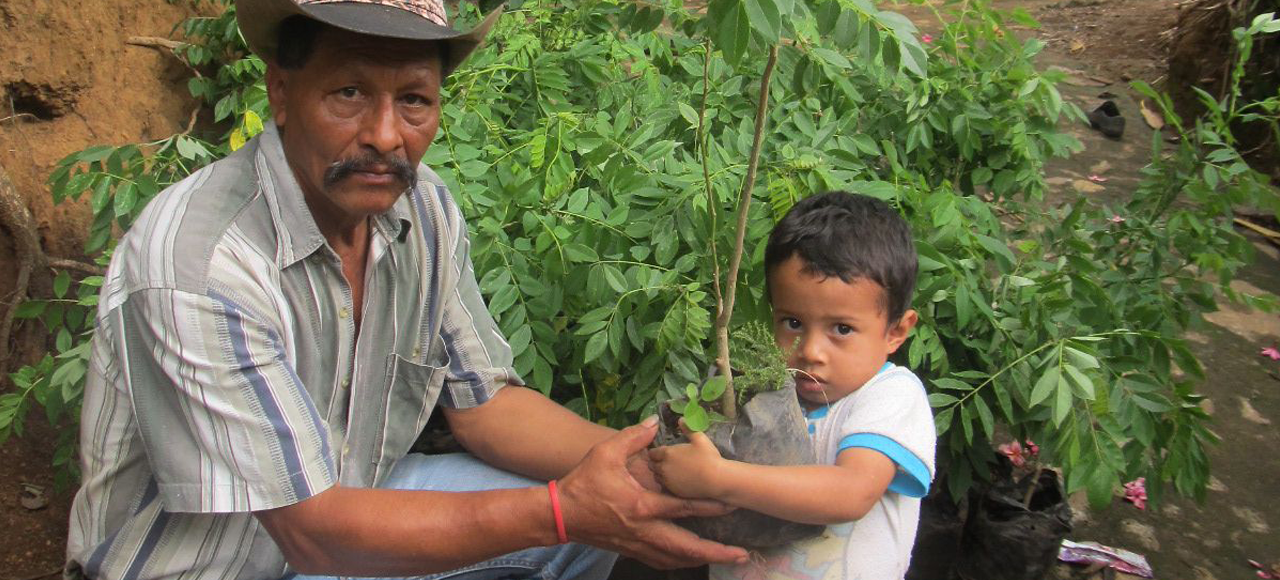 Fighting climate change, one tree at a time
Fighting climate change, one tree at a time
Preserving water sources and the soil in Central America with tens of thousands of trees
Actually, the situation is quite simple: where trees grow, there is also water and fertile soil. The roots of the trees strengthen the soil so that more rainwater seeps away instead of running off. This raises the groundwater level and the soil quality is preserved. Reason enough, one would think, to protect the forests! But in Central America, plantations are spreading while ever larger areas are being deforested. This exacerbates the already extreme consequences of climate change that people there are already struggling with: Most recently in November 2020, two hurricanes caused severe devastation (INKOTA, 2020a). Due to high greenhouse gas emissions, Germany bears a major responsibility for the global climate crisis and thus also for the increase in extreme weather events in Central America. The high demand for biofuels, palm oil and bananas is also causing more and more tropical forest areas to disappear there (CIR, 2019).
Necessity
Reforestation of deforested watersheds and slopes to secure the livelihoods of smallholder families in Central America.
Activity
Community members plant 80,000 trees to protect water sources and slopes.
Countable effort
Number of tree seedlings planted in the watersheds and on slopes.
Result
After about three years: The planted trees grow well, raise the water table and improve soil fertility.
Systemic effect
Community members have secure access to water, their crops are more productive and their food security is improved.
Background
The Global Climate Risk Index (Germanwatch, 2021) shows that Central America is already one of the world regions most affected by climate change. Rising temperatures, recurring droughts, increasing deforestation – the Centro Humboldt (2020), a partner organisation of INKOTA in Nicaragua, therefore refers to a “deepening environmental crisis”. However, the governments of the INKOTA project countries Nicaragua, El Salvador and Guatemala have not yet developed sustainable policies to protect natural resources such as forests and water. On the contrary, existing forest areas are shrinking almost inexorably and trees are actually still being cut down in areas with springs. As a result, rainwater runs off and water sources become diminished – some actually dry up completely. Large agricultural companies are making the situation even worse: They use ever deeper wells to irrigate their plantations, for example for the cultivation of sugar cane. Smallholder families suffer most from this. They depend on their harvests, but access to water is getting worse. “We have to take action now, both collectively and individually! Otherwise we may miss our last chance to stop climate change,” warns Víctor Campos of Centro Humboldt. “Reforestation is an effective weapon against climate change. Sapling by sapling and tree by tree, we improve the microclimate and the water sources can recover.”
The good deed
Your donation will help reforest slopes and water source catchment areas in 18 counties in El Salvador, Nicaragua and Guatemala. Every good deed makes it possible to plant a tree. Together with the project participants, INKOTA's partner organisations establish tree nurseries, plant the seedlings and integrate trees into pasture and arable land. The reforestation makes an important contribution to environmental and forest protection. More than 65,000 people benefit from this. Slopes can be stabilised by trees, as they provide protection against erosion and landslides. Agricultural land that integrates trees is more resilient to droughts, which are becoming more frequent in the wake of the climate crisis (INKOTA, 2020b). In addition, many of the trees planted are fruit trees, which contribute to a healthier diet. Mangoes and oranges can improve the health of children in dozens of poverty-stricken communities, providing a better future. The trees planted also contribute to climate change adaptation.

AboutEl Salvador
El Salvador
Capital
6,486,201
Number of inhabitants
3,799 USD
Gross domestic product per capita per year
124 of 189
Human Development Index
El Salvador is the smallest country in Central America, a region with immense biodiversity, which is, however, acutely threatened by deforestation.
About the organization and further information
Association
INKOTA-netzwerk e.V.
Website


Further information and source
- Centro Humboldt (CH), 2020. Situación ambiental Nicaragua 2019, valoraciones para un balence ambiental, Stand: 23.03.2021, Managua.
- Christliche Initiative Romero (CIR), 2019. Der deutsche Rohstoffhunger und seine menschenrechtlichen Folgen im Globalen Süden. Eine Studie zu den Lieferketten von Kupfer und Molybdän aus Mexiko und Palmöl aus Guatemala, Stand: 29.03.2021, Münster.
- Germanwatch, 2021. Globaler Klima-Risiko-Index 2021, Zusammenfassung, Stand: 27.03.2021, Bonn.
- INKOTA netzwerk e. V., 2020a. Erst Corona, dann der Hurrikan, Stand: 01.04.2021, Berlin.
- INKOTA netzwerk e. V., 2020b: INKOTA-Infoblatt Welternährung 19: Agroforstwirtschaft, Stand: 25.03.2021, Berlin.




